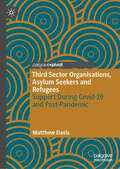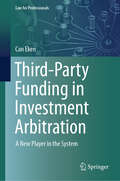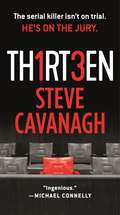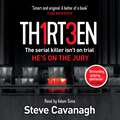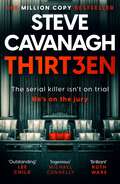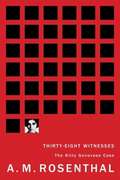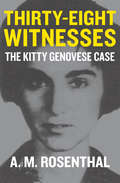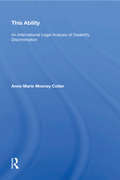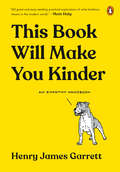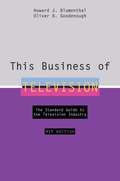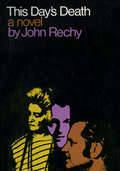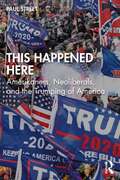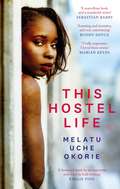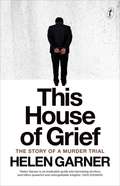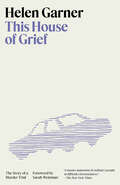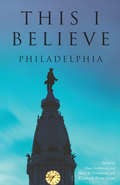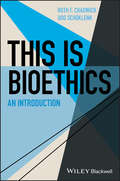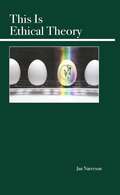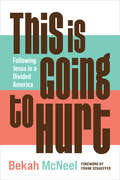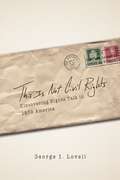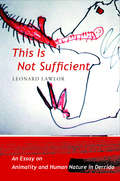- Table View
- List View
Third Party Protection in Shipping (Contemporary Commercial Law)
by Carlo CorcioneThis book examines third party protection in shipping. Today, shipping is not just a part of the supply chain; it is indistinguishable from it. Once at the periphery, third party protection is now a central element of carriage. This matter is addressed by means of analysis of the current legal framework in relation to third parties and an evaluation of how, within this framework, the law applicable to a third party may be uncovered. Third party protection is analysed under the following: the Hague/Hague-Visby Rules; the Hamburg Rules; the Rotterdam Rules; English law and United States law; and civil law. With its breadth of coverage and high-quality analysis, this book is vital reading for both professional and academic readers with an interest in shipping and international trade.
Third Sector Organisations, Asylum Seekers and Refugees: Support During Covid-19 and Post-Pandemic
by Matthew DavisThis short Pivot explores the the physical, emotional, and psychological impact of the lived experiences of asylum seekers on the staff and volunteers of third sector organisations who assist and support them. This research casts a direct light on the issues, challenges, and barriers of their work during and after the pandemic. It seeks to pinpoint the needs of staff which should be addressed by employers of third sector organisations to improve efficiency and wellbeing from an operational viewpoint, a mental health lens and psychological perspective. It adopts a Constructivist Grounded Theory (CGT) — a qualitative research method that involves co-constructing theories with participants. The research effectively examines how frontline organisations need to change given the social, economic and political challenges faced by asylum seekers and refugees in accessing support alongside the impact of new Government immigration, asylum policies and new legislation at that time. It also provides insights into the lived experiences of asylum seekers and refugees.
Third-Party Funding in Investment Arbitration: A New Player in the System (Law for Professionals)
by Can EkenThis book offers a reference guide that can be consulted by all users of Third-Party Funding (TPF), lawyers, students, and other interested readers. In addition to analyzing TPF issues holistically, with both doctrinal and empirical methods, the book provides important empirical data on funders through interviews conducted with nearly thirty people working for third-party funders. It reveals a range of potential problems and lays out how to address them in the form of guidelines. TPF has become a significant element of litigation and arbitration systems around the world for both theoretical and practical reasons. Specifically, in the context of investment arbitration, the latest studies suggest that a large percentage of investment arbitration cases are sponsored by funders. Despite its prevalence, TPF has raised procedural and ethical concerns in the investment regime. One of the caveats is that when states lose against an investor, their taxpayers are who pay for the investment arbitration award, essentially transferring the wealth of the states to the investor, and now part of this wealth goes to the funder. Whether or not the funder shares this wealth is anyone’s guess and represents an ethical consideration. Apart from ethical challenges, TPF has also raised significant procedural problems in investment arbitration. As funders enter the equation of arbitration proceedings in the investment regime, consideration must be given to this new player and how TPF affects investment arbitration. Overall, the book assesses TPF in its entirety: background information, the main procedural issues and case law, ethical aspects, and empirical research on TPF, including the funder’s perspective. By doing so, it sheds new light on under-researched issues and offers essential guidance to help orient legal policy.
Thirteen: The Serial Killer Isn't on Trial. He's on the Jury. (Eddie Flynn #3)
by Steve CavanaghThirteen is the legal thriller Lee Child, Michael Connelly, and Ruth Ware are raving about and readers can’t put down.“Outstanding - an intriguing premise, a tense, gripping build-up, and a spectacular climax. This guy is the real deal. Trust me.” —Lee Child“A dead bang BEAST of a book that expertly combines Cavanagh’s authority on the law with an absolutely great thrill ride. Books this ingenious don’t come along very often.” —Michael ConnellyIt’s the murder trial of the century. And Joshua Kane has killed to get the best seat in the house – and to be sure the wrong man goes down for the crime. Because this time, the killer isn’t on trial. He’s on the jury.But there’s someone on his tail. Former-conman-turned-criminal-defense-attorney Eddie Flynn doesn’t believe that his movie-star client killed two people. He suspects that the real killer is closer than they think – but who would guess just how close? “A brilliant, twisty, ingeniously constructed puzzle of a book. Steve Cavanagh pulls off an enviable premise with panache.” —Ruth Ware
Thirteen: The serial killer isn't on trial. He's on the jury (Eddie Flynn Series)
by Steve Cavanagh'Plotting that takes the breath away' Ian Rankin'Steve is a fantastic thriller writer' Mark BillinghamHollywood actor Robert Soloman stands accused of the brutal stabbings of his wife and her lover but he is desperately pleading that he had nothing to do with it. This is the trial of the century and the defence want Eddie Flynn on their team.The biggest case Eddie has ever tried before, he decides to take it on despite the overwhelming evidence that Robert is guilty. As the trial starts, Eddie becomes sure of Robert's innocence but there's something else he is even more sure of - that there is something sinister going on in the jury box. Because of this, he is forced to ask the question: What if the killer isn't on the stand? What if he's on the jury?Read by Adam Sims(p) Orion Publishing Group 2018
Thirteen: The serial killer isn't on trial. He's on the jury (Eddie Flynn Series)
by Steve CavanaghTHE SERIAL KILLER ISN'T ON TRIAL.HE'S ON THE JURY...****************'Books this ingenious don't come along very often.' Michael Connelly'THIRTEEN is my favourite read of the year.' Sarah Pinborough'Outstanding.' Lee Child'Smart and original. This is a belter of a book.' Clare Mackintosh****************'To your knowledge, is there anything that would preclude you from serving on this jury?'Murder wasn't the hard part. It was just the start of the game.Joshua Kane has been preparing for this moment his whole life. He's done it before. But this is the big one.This is the murder trial of the century. And Kane has killed to get the best seat in the house.But there's someone on his tail. Someone who suspects that the killer isn't the man on trial.Kane knows time is running out - he just needs to get to the conviction without being discovered.****************THIRTEEN REASONS WHY ... YOU MUST READ THIS BOOK:'An oh so clever hook for an oh so clever, gripping book. THIRTEEN is courtroom drama at its finest, blended with page-turning twists and characters you can't get enough of. Steve Cavanagh is the John Grisham for a new generation. Slick, thrilling and unique, THIRTEEN is my favourite read of the year.' Sarah Pinborough'Outstanding - an intriguing premise, a tense, gripping build-up, and a spectacular climax. This guy is the real deal. Trust me.' Lee Child'Smart and original. This is a belter of a book.' Clare Mackintosh'Great hook. Great plot. Great book. Thirteen is a real page turner and one you won't want to put down.' Simon Kernick'A brilliant, twisty, ingeniously constructed puzzle of a book. Steve Cavanagh pulls off an enviable premise with panache.' Ruth Ware'I've been tracking Steve Cavanagh for a few years now and Thirteen is his best, a dead bang beast of a book that expertly combining his authority on the law with an absolutely great thrill ride. Books this ingenious don't come along very often.' Michael Connelly'Quite simply deserves to be HUGE. If you read a thriller as good this year, it's only because you've read this one twice.' Mark Billingham'Tore through this between dusk and dawn. Absolute 5-star cracker from Steve Cavanagh, who's gotta be among top legal thriller writers out there nowadays. A powerhouse of a book that's much more than its high-concept hook.' Craig Sisterson'Wow! This book is friggin' awesome! Utterly immersive.' Emma Kavanagh'Fantastically gripping? Guilty as charged!' Angela Clarke'An absolute cracker.' Susi Holliday'Guilty of thrills, twists, and expertly manipulating the reader.' Mason Cross'An absolute rollercoaster of a read. Thrilling.' Cass Green
Thirteen: The serial killer isn’t on trial. He’s on the jury (Eddie Flynn Series)
by Steve CavanaghTHE SERIAL KILLER ISN'T ON TRIAL.HE'S ON THE JURY...****************'Books this ingenious don't come along very often.' Michael Connelly'THIRTEEN is my favourite read of the year.' Sarah Pinborough'Outstanding.' Lee Child'Smart and original. This is a belter of a book.' Clare Mackintosh****************'To your knowledge, is there anything that would preclude you from serving on this jury?'Murder wasn't the hard part. It was just the start of the game.Joshua Kane has been preparing for this moment his whole life. He's done it before. But this is the big one.This is the murder trial of the century. And Kane has killed to get the best seat in the house.But there's someone on his tail. Someone who suspects that the killer isn't the man on trial.Kane knows time is running out - he just needs to get to the conviction without being discovered.****************THIRTEEN REASONS WHY ... YOU MUST READ THIS BOOK:'An oh so clever hook for an oh so clever, gripping book. THIRTEEN is courtroom drama at its finest, blended with page-turning twists and characters you can't get enough of. Steve Cavanagh is the John Grisham for a new generation. Slick, thrilling and unique, THIRTEEN is my favourite read of the year.' Sarah Pinborough'Outstanding - an intriguing premise, a tense, gripping build-up, and a spectacular climax. This guy is the real deal. Trust me.' Lee Child'Smart and original. This is a belter of a book.' Clare Mackintosh'Great hook. Great plot. Great book. Thirteen is a real page turner and one you won't want to put down.' Simon Kernick'A brilliant, twisty, ingeniously constructed puzzle of a book. Steve Cavanagh pulls off an enviable premise with panache.' Ruth Ware'I've been tracking Steve Cavanagh for a few years now and Thirteen is his best, a dead bang beast of a book that expertly combining his authority on the law with an absolutely great thrill ride. Books this ingenious don't come along very often.' Michael Connelly'Quite simply deserves to be HUGE. If you read a thriller as good this year, it's only because you've read this one twice.' Mark Billingham'Tore through this between dusk and dawn. Absolute 5-star cracker from Steve Cavanagh, who's gotta be among top legal thriller writers out there nowadays. A powerhouse of a book that's much more than its high-concept hook.' Craig Sisterson'Wow! This book is friggin' awesome! Utterly immersive.' Emma Kavanagh'Fantastically gripping? Guilty as charged!' Angela Clarke'An absolute cracker.' Susi Holliday'Guilty of thrills, twists, and expertly manipulating the reader.' Mason Cross'An absolute rollercoaster of a read. Thrilling.' Cass Green
Thirty-Eight Witnesses: The Kitty Genovese Case
by A. M. Rosenthal"[Rosenthal] told a stunning, tragic story and called each one of us to account for averting our eyes-- and hearts-- and voices." -Mike Wallace, 60 Minutes. It remains one of the most notorious deaths in New York City history not because of who was murdered but because of the circumstances: 28-year-old Kitty Genovese was brutally murdered, in an attack that took nearly thirty minutes and had thirty-eight witnesses... not one of whom did a thing to stop the murderer or even call for help. A.M. Rosenthal, who would later become one of the most famous and controversial editors The New York Times has ever had, was the newspaper's city editor then; the murder happened on his beat. He first published this book in 1964, the year of the murder. It is part memoir, part investigative journalism, and part public service.
Thirty-Eight Witnesses: The Kitty Genovese Case
by A. M. RosenthalA Pulitzer Prize-winning journalist's groundbreaking account of the crime that shocked New York City--and the world In the early hours of March 13, 1964, twenty-eight-year-old Catherine "Kitty" Genovese was stabbed to death in the middle-class neighborhood of Kew Gardens, Queens. The attack lasted for more than a half hour--enough time for Genovese's assailant to move his car and change hats before returning to rape and kill her just a few steps from her front door. Yet it was not the brutality of the murder that made it international news. It was a chilling detail Police Commissioner Michael Joseph Murphy shared with A. M. Rosenthal of the New York Times: Thirty-eight of Genovese's neighbors witnessed the assault--and none called for help. To Rosenthal, who had recently returned to New York after spending a decade overseas and would become the Times's longest-serving executive editor, that startling statistic spoke volumes about both the turbulence of the 1960s and the enduring mysteries of human nature. His impassioned coverage of the case sparked a firestorm of public indignation and led to the development of the psychological theory known as the "bystander effect." Thirty-Eight Witnesses is indispensable reading for students of journalism and anyone seeking to learn about one of the most infamous crimes of the twentieth century.
This Ability: An International Legal Analysis of Disability Discrimination
by Anne-Marie Mooney CotterThis Ability is Cotter's third book in a series dealing with discrimination law. Having looked at the theme of 'gender discrimination' in Gender Injustice and 'race discrimination' in Race Matters, this further installment takes a similar approach and structure to illustrate comparisons and contradictions in discrimination law. Disability Law is an increasingly important area in combating disability discrimination. This Ability provides readers with a better understanding of the issue of inequality and aims to increase the likelihood of achieving equality at both the national and international levels for those with disabilities while at the same time educating those without disabilities. The work examines the primary role of legislation and its impact on the court process. It also discusses the two most important trade agreements of our day - namely the North American Free Trade Agreement and the European Union Treaty - in a historical and compelling analysis of discrimination. By providing a detailed examination of the relationship between disability issues and the law, this book will be an important read for those concerned with equality.
This Book Will Make You Kinder: An Empathy Handbook
by Henry James GarrettFrom the creator of Drawings of Dogs, a warmly illustrated and thoughtful examination of empathy and the necessity of being kinderThe kindness we owe one another goes far beyond the everyday gestures of feeding someone else's parking meter--although it's important not to downplay those small acts. Kindness can also mean much more. In this timely, insightful guide, Henry James Garrett lays out the case for developing a strong, courageous, moral kindness, one that will help you fight cruelty and make the world a more empathetic place.So, how could a book possibly make you kinder? It would need to answer two questions: • Why are you kind at all? and, • Why aren't you kinder?In these pages, building on his academic studies in metaethics and using his signature-sweet animal cartoons, Henry James Garrett sets out to do just that, exploring the sources and the limitations of human empathy and the many ways, big and small, that we can work toward being our best and kindest selves for the people around us and the society we need to build.
This Business of Television
by Howard Blumenthal Oliver GoodenoughBroad in scope and rich in detail,This Business of Television has been the essential sourcebook for producers, writers, broadcasters, network executives, and other television professionals since the first edition was published in 1991. And as the television business continues to evolve,This Business of Television evolves along with it. This comprehensive guide to the legal, economic, and production aspects of the industry has been completely revised and restructured to reflect the rapid changes in television today, both domestically and internationally.
This Day's Death: A Novel (Books That Changed the World)
by John RechyA novel on the legality of love from the author of City of Night, &“one of the few original American writers of the last century&” (Gore Vidal, public intellectual and author of I Told You So). A man confronts the twin nightmares of death and silent injustice in John Rechy&’s third novel. While juggling the care of his ailing mother, a young law student stands trial in Los Angeles on a charge that exposes him to the depths and intricacies of society&’s twisted conceptions of justice and privacy. In This Day&’s Death, &“[Rechy] deals with experience from the inside, and it&’s possible he offers us more unevaluated and uncodified homosexual feeling than any writer in the United States today&” (The New York Times). Praise for John Rechy &“Rechy shows great comic and tragic talent. He is truly a gifted novelist.&” —Christopher Isherwood, author and playwright &“His tone rings absolutely true, is absolutely his own, and he has the kind of discipline which allows him a rare and beautiful recklessness. He tells the truth, and tells it with such passion that we are forced to share in the life he conveys. This is a most humbling and liberating achievement.&” —James Baldwin, novelist, playwright, and activist &“His uncompromising honesty as a gay writer has provoked as much fear as admiration . . . John Rechy doesn&’t fit into categories. He transcends them. His individual vision is unique, perfect, loving and strong.&” —Carolyn See, author of Dreaming: Hard Luck and Good Times in America
This Happened Here: Amerikaners, Neoliberals, and the Trumping of America
by Paul StreetThis book examines the Trump phenomenon and presidency as fascist. Fascism here connotes not generically "bad" politics or a consolidated political-economic regime (Mussolini’s Italy or Hitler’s Germany) but a set of political, movement, and ideological traits understood within the context of the neoliberal-capitalist era. While Trump’s election defeat is a respite, the nation is far from out of the neofascist woods. Defeating the menace will require political and societal restructuring far beyond what is imagined by Democrats. This argument is developed across seven chapters that recount Trump’s assault on the 2020 election, specifically define the meaning of fascism as it is used in this book, demonstrate the neofascist nature of the Trump presidency, engage intellectual class Trumpism-fascism-denial, analyze the Trump base, root Trumpism in a longstanding and indeed founding American white nationalism, examine why Trump rose to power when he did, and suggest paths for fascism-proofing the USA.
This Happened Here: Amerikaners, Neoliberals, and the Trumping of America
by Paul StreetThis book examines the Trump phenomenon and presidency as fascist. Fascism here connotes not generically "bad" politics or a consolidated political-economic regime (Mussolini’s Italy or Hitler’s Germany) but a set of political, movement, and ideological traits understood within the context of the neoliberal-capitalist era. While Trump’s election defeat is a respite, the nation is far from out of the neofascist woods. Defeating the menace will require political and societal restructuring far beyond what is imagined by Democrats. This argument is developed across seven chapters that recount Trump’s assault on the 2020 election, specifically define the meaning of fascism as it is used in this book, demonstrate the neofascist nature of the Trump presidency, engage intellectual class Trumpism-fascism-denial, analyze the Trump base, root Trumpism in a longstanding and indeed founding American white nationalism, examine why Trump rose to power when he did, and suggest paths for fascism-proofing the USA.
This Hostel Life
by Melatu Uche OkorieSHORTLISTED FOR THE AN POST IRISH BOOK AWARDS SUNDAY INDEPENDENT NEWCOMER OF THE YEAR'A landmark book by an important new voice in Irish writing' EMILIE PINETHIS HOSTEL LIFE tells the stories of migrant women in a hidden Ireland.Queuing for basic supplies in an Irish direct provision hostel, a group of women squabble and mistrust each other, learning what they can of the world from conversations about reality television and Shakespeare. In another story, a student shares her work with a class only to be critiqued about her own lived experience, and a mother of young twins, living in Nigeria, is at risk of losing her newborns to ancient superstitious beliefs.An essay by Liam Thornton (UCD School of Law) is also included, explaining the Irish legal position in relation to asylum seekers and direct provision.'Fresh, devastating stories . . . Okorie writes with uncomfortable clarity about things we think we already know' LIA MILLS 'Melatu Uche Okorie has important things to say - and she does it quite brilliantly' RODDY DOYLE
This Hostel Life
by Melatu Uche OkorieSHORTLISTED FOR THE AN POST IRISH BOOK AWARDS SUNDAY INDEPENDENT NEWCOMER OF THE YEAR'A landmark book by an important new voice in Irish writing' EMILIE PINETHIS HOSTEL LIFE tells the stories of migrant women in a hidden Ireland.Queuing for basic supplies in an Irish direct provision hostel, a group of women squabble and mistrust each other, learning what they can of the world from conversations about reality television and Shakespeare. In another story, a student shares her work with a class only to be critiqued about her own lived experience, and a mother of young twins, living in Nigeria, is at risk of losing her newborns to ancient superstitious beliefs.An essay by Liam Thornton (UCD School of Law) is also included, explaining the Irish legal position in relation to asylum seekers and direct provision.'Fresh, devastating stories . . . Okorie writes with uncomfortable clarity about things we think we already know' LIA MILLS 'Melatu Uche Okorie has important things to say - and she does it quite brilliantly' RODDY DOYLE
This House of Grief: The Story of a Murder Trial
by Helen GarnerWinner of the NED KELLY AWARD, BEST TRUE CRIME BOOK, 2016. On Father's Day 2005, three young boys drowned when the car their father was driving went off the road and plunged into a dam. Was it an accident or was it an intentional act of vengeance against his ex-wife for taking most of his material goods in a divorce and taking up with a new man? Is he innocent or guilty? That was the subject of the his two trials the author attended. Her description and analysis of this case, its participants, and human behavior will astonish you.
This House of Grief: The Story of a Murder Trial
by Helen GarnerThe New York Times Book Review Editors' Choice • The engrossing true-crime classic from one of Australia&’s most acclaimed writers, that follows a man and his broken life, a community wracked by tragedy, and the long and torturous road to closure •"This House of Grief, in its restraint and control, bears comparison with In Cold Blood."—Kate Atkinson, author of Big Sky and Shrines of GaietyOn the evening of Father&’s Day, 2005, separated husband Robert Farquharson was driving his three young sons back to their mom&’s house when the car veered off the road and plunged into a dam. Farquharson survived the crash, but his boys drowned. Was this a tragic accident, or an act of revenge? The court case that followed became a national obsession—a macabre parade of witnesses, family members, and the defendant himself, each forced to relive the unthinkable for an audience of millions.In This House of Grief, celebrated writer Helen Garner tells the definitive and deeply absorbing story of it all, from crash to final verdict. Through a panoply of perspectives, including her own as a member of the public, Garner captures the exacting procedure and brutal spectacle of Australia&’s criminal justice system. The result is a richly textured portrait—of a man and his broken life, of a community wracked by tragedy, and of the long and torturous road to closure.Considered a literary institution in Australia, Helen Garner&’s incisive nonfiction evokes the keen eye of the New Journalists. Brisk, candid, and never dismissive of its flawed subjects, This House of Grief is a masterwork of literary journalism.
This I Believe: Philadelphia
by This I Believe, Inc.An essay collection highlighting guiding principles, containing 30 works from the contemporary Philadelphia radio series, and 30 from the 1950s original.This I Believe is an international project engaging people in writing, sharing, and discussing the core values that guide their daily lives. And it all started in Philadelphia more than seven decades ago with a local radio series that became an international sensation.This book features thirty essays from that original 1950s This I Believe radio series, including contributions from publisher and philanthropist Walter Annenberg, classicist and educator Edith Hamilton, anthropologist Margaret Mead, and Pulitzer Prize–winning author James Michener.Complementing those historical selections are thirty contemporary essays produced through a partnership among This I Believe, WHYY, and Leadership Philadelphia. These essayists include Philadelphia Inquirer columnist Frank Fitzpatrick, Grammy Award–winner Kenny Gamble, Philadelphia Mural Arts Program executive director Jane Golden, and Mayor Michael Nutter.Altogether, this collection is an insightful reflection of the guiding principles that drive the people of Philadelphia, who believe in brotherly love—and so much more.
This Is Bioethics: An Introduction (This Is Philosophy Ser.)
by Udo Schuklenk Ruth F. ChadwickShould editing the human genome be allowed? What are the ethical implications of social restrictions during a pandemic? Is it ethical to use animals in clinical research? Is prioritizing COVID-19 treatment increasing deaths from other causes? Bioethics is a dynamic field of inquiry that draws on interdisciplinary expertise and methodology to address normative issues in healthcare, medicine, biomedical research, biotechnology, public health, and the environment. This Is Bioethics is an ideal introductory textbook for students new to the field, exploring the fundamental questions, concepts, and issues within this rapidly evolving area of study. Assuming no prior knowledge of the subject, this accessible volume helps students consider both traditional and cutting-edge questions, develop informed and defensible answers, and evaluate the strengths and weaknesses of a diverse range of ethical positions in medicine. The authors avoid complex technical terms and jargon in favor of an easy-to-follow, informal writing style with engaging chapters designed to stimulate student interest and encourage class discussion. The book also features a deep dive into the realm of global public health ethics, including the response to the COVID-19 pandemic. It considers topics like triage decision-making, the proportionality of society's response to COVID-19, whether doctors have a professional obligation to treat COVID-19 patients, and whether vaccines for this virus should be mandatory. A timely addition to the acclaimed This Is Philosophy series, This Is Bioethics is the ideal primary textbook for undergraduate bioethics and practical ethics courses, and is a must-have reference for students in philosophy, biology, biochemistry, and medicine.
This Is Ethical Theory
by Jan NarvesonEthical questions lie at the very heart of all philosophy, and no one is better equipped to untangle the many facets of ethical theory than respected thinker and professor Jan Narveson. <P><P> Drawing from theoretical notions as well as everyday applications, Narveson simplifies these nuanced ideas for any beginning ethicist. Discussing theoretical elements ranging from intuitionism to naturalism, emotivism to metaethics, Narveson's approach to this complex topic is one that any reader will find accessible.
This Is Going to Hurt: Following Jesus in a Divided America
by Bekah McNeel&“If you see me at a party and I&’m speaking, you need to come rescue the person I&’m talking to, because they are not having a good time. Or better yet, I would like to invite you, the reader, into the corner with me to talk about the story I write over and over again: People are suffering.&” In her career as a journalist, Bekah McNeel has encountered (and written about) a lot of suffering. After all, the most polarizing topics in US politics all revolve around suffering. But when confronted with these stories of suffering, many people respond not with action, but by offering counterstories that justify their lack of compassion. This set Bekah wondering: Whose suffering do we try to alleviate? Whose do we ignore? And how should our faith guide how we approach these debates? In This Is Going to Hurt, Bekah analyzes the narratives surrounding six hot-button issues—immigration, COVID, abortion, critical race theory, gun violence, and climate change. For each topic, she exposes how &“us versus them&” thinking leads us to turn a blind eye to injustice. She also offers an alternative perspective on each issue, based on a sensitive reading of the gospel. Amid culture wars that goad us to take up arms, Bekah reminds us that Christ calls us to take up our cross. Humorous and insightful, This Is Going to Hurt offers a breath of fresh air for readers seeking a nuanced and authentically Christian mode of political engagement.
This Is Not Civil Rights: Discovering Rights Talk in 1939 America (Chicago Ser. In Law And Society Ser.)
by George I. LovellSince at least the time of Tocqueville, observers have noted that Americans draw on the language of rights when expressing dissatisfaction with political and social conditions. As the United States confronts a complicated set of twenty-first-century problems, that tradition continues, with Americans invoking symbolic events of the founding era to frame calls for change. Most observers have been critical of such “rights talk.” Scholars on the left worry that it limits the range of political demands to those that can be articulated as legally recognized rights, while conservatives fear that it creates unrealistic expectations of entitlement. Drawing on a remarkable cache of Depression-era complaint letters written by ordinary Americans to the Justice Department, George I. Lovell challenges these common claims. Although the letters were written prior to the emergence of the modern civil rights movement—which most people assume is the origin of rights talk—many contain novel legal arguments, including expansive demands for new entitlements that went beyond what authorities had regarded as legitimate or required by law. Lovell demonstrates that rights talk is more malleable and less constraining than is generally believed. Americans, he shows, are capable of deploying idealized legal claims as a rhetorical tool for expressing their aspirations for a more just society while retaining a realistic understanding that the law often falls short of its own ideals.
This Is Not Sufficient: An Essay on Animality and Human Nature in Derrida
by Leonard LawlorDerrida wrote extensively on "the question of the animal." In particular, he challenged Heidegger's, Husserl's, and other philosophers' work on the subject, questioning their phenomenological criteria for distinguishing humans from animals. Examining a range of Derrida's writings, including his most recent L'animal que donc je suis, as well as Aporias, Of Spirit, Rams, and Rogues, Leonard Lawlor reconstructs a portrait of Derrida's views on animality and their intimate connection to his thinking on ethics, names and singularity, sovereignty, and the notion of a common world.Derrida believed that humans and animals cannot be substantially separated, yet neither do they form a continuous species. Instead, in his "staggered analogy," Derrida asserts that all living beings are weak and therefore capable of suffering. This controversial claim both refuted the notion that humans and animals possess autonomy and contradicted the assumption that they possess the trait of machinery. However, it does offer the foundation for an argument-which Lawlor brilliantly and passionately defines in his book-in which humans are able to will this weakness into a kind of unconditional hospitality. Humans are not strong enough to keep themselves separate from animals. In other words, we are too weak to keep animals from entering into our sphere. Lawlor's argument is a bold approach to remedying "the problem of the worst," or the complete extermination of life, which is fast becoming a reality.

